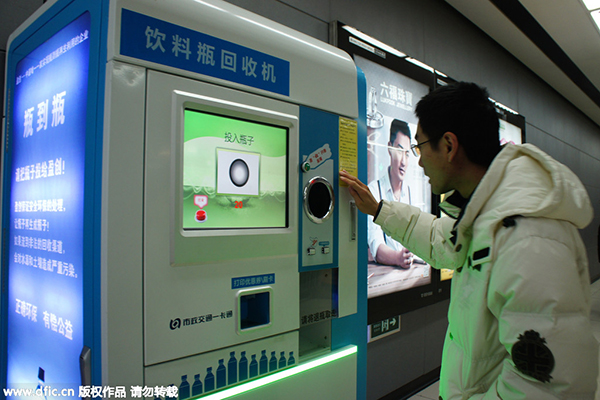Recycle tech leads charge on green investments
Updated: 2015-11-28 09:54
(Xinhua)
|
|||||||||||
 |
|
A man tries out a drinking bottle recycling machine at a subway station in Beijing, Dec 23, 2012. [Photo/IC] |
BEIJING - Open an app, locate the nearest recycling machine, throw the bottles inside and get an instant reward on your metro card.
This is how more than 18 million plastic bottles were recycled in Beijing in the past few years using 2,200 reverse vending machines (RVM) offered by Incom recycle.
Backed by one of the world's largest asset managers, Franklin Templeton Investments, and recently partnered with Norwegian recycling firm Tomra, Incom is one of many Chinese firms in the green industry that are attracting global investors' attention.
As China heads toward a green economy, the country's green sector including waste recycling, sewage disposal, energy conservation are growing at a rapid pace and are hungry for investment -- from both home and abroad.
According to official estimation, China will need at least 2 trillion yuan ($313 billion) every year to fund its green sector, 85 percent of which needs to come from capital other than fiscal fund.
The waste recycling market alone is huge and hardly tapped: an estimated 500 billion beverage containers need to be recycled every year, making China the single biggest market for global recycling companies seeking expansion.
The development of the green industry in China is still at the preliminary level, said Haakon Volldal, vice president of Tomra, the world's biggest RVM maker that just established two joint ventures with Incom in China this month.
"In this five-year period, China can take big steps towards having a professional green industry," Volldal said.
Green means business
The biggest obstacle for green companies to get the funding they need is always their own profitability.
Traditionally, green companies operate much more like non-profits with low returns or even live solely on government support, deterring typical investors looking for high returns.
But companies like Incom are changing the traditional mindset by incorporating Internet technology into its business model to prove one fact: green companies can make money, too.
For the first time since its founding in 2008, Incom recycle has turned a profit this year through selling equipment and advertising for beverage brands on the machines, according to the company's general manager Chang Tao.
Future income streams may also be generated from data on consumption patterns collected by its machines -- do people in Beijing actually drink Coca-Cola more than Pepsi? Which flavor sports drinks do males in Chongqing prefer?
Related Stories
Recycling sites mining fortunes from e-waste 2015-10-21 07:55
Recycling discarded plastic bottles generates cash 2015-08-18 13:24
China finds waste is a terrible thing to waste 2015-01-19 07:34
Green lending surge is good news for sustainable growth 2015-10-22 07:39
China's green economy could create enormous business opportunities 2015-10-07 10:10
Today's Top News
Beijing to adopt world's strictest emissions standard
Erdogan-Putin meeting possible: Turkish presidency
China to spend $438b on new rails over the next five years
Xi urges breakthroughs in military structural reform
Chinese play growing part in online shopping
Surviving Russian pilot says no warning from Turkey
Xi to attend Paris climate conference
Putin: Turkey's downing of jet 'stab in the back'
Hot Topics
Lunar probe , China growth forecasts, Emission rules get tougher, China seen through 'colored lens', International board,
Editor's Picks

|

|

|

|

|

|






